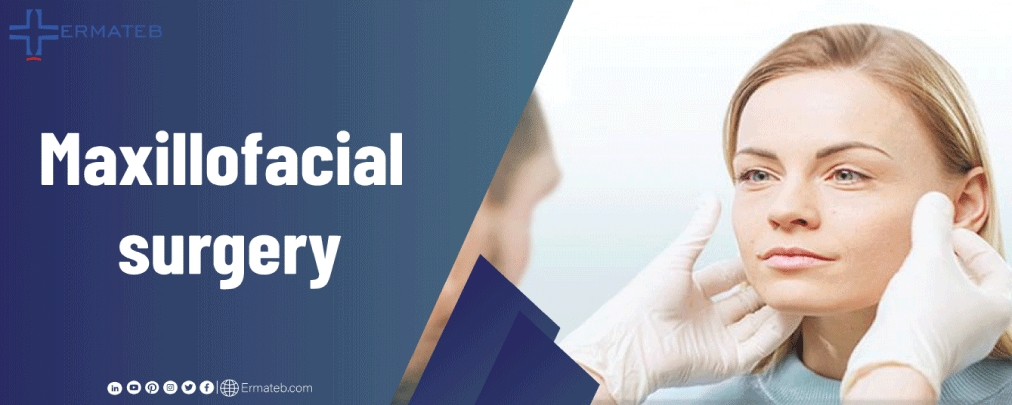
All conditions involved the teeth, jaws, bones, and even soft tissues of the face that cause any problems in your daily life like pain or lack of confidence is related to maxillofacial specialty, and the patient can visit a maxillofacial surgeon for improving their condition. The maxillofacial surgeon will do whatever is necessary to correct abnormalities and relieve the pain so that a patient can return to normal activities.
As it's clear from what it is called, all procedures involving the face and front part of the head are called maxillofacial. Maxillo has a Latin word root and it means jawbone. Due to this meaning maxillofacial is a term that involves with face and jawbone. Maxillofacial is a specialty I'm medical field that treats the conditions in this area through surgical procedures.
The maxillofacial surgeon is a dentist who has specialized in advanced medicine that involves conditions affecting not only the teeth and jawbones but also the other facial bones and soft tissues, as well as the training required to treat these conditions surgically and appropriately administer anesthesia. As the teeth are in the mouth area, the mouth is closely connected with the jaws and comprises an integral part of the face, the term oral and maxillofacial surgeon is often applied to these professionals.
However maxillofacial surgeons are oral surgeons, all oral surgeons are not able to operate on maxillofacial areas. Maxillofacial surgeons have trained much more than oral surgeons and they have got special certifications that prove their knowledge in all types of procedures in various areas of the face.
They are called sometimes oral surgeons because their practices are confined almost entirely for treatment of conditions within the mouth. The following are treatments that an oral surgeon can perform:
• Denture fittings
• Dental crowns
• Root canals
• Impacted wisdom tooth extraction
Furthermore, they are able to treat complications involved with the temporomandibular joint(the area which the lower jaw attaches to the skull), or even infections in the oral area that cause pain and swelling.
Unfortunately, the word “oral surgeon” is sometimes used, somewhat inaccurately, by oral and maxillofacial surgeons. Be sure you understand the difference between these two terms and ensure that your chosen doctor can perform the process you need before you go in for treatment.
As it was mentioned in the text maxillofacial treatments are more complicated than simple oral treatments. The maxillofacial surgeon can do all treatments an oral surgeon does and much more besides. An oral and maxillofacial surgeon holds a medical specialty and has extensive training in dental and surgical medicine. A maxillofacial surgeon has no limitations in different types of procedures and treatments in the face and oral areas. This means that a maxillofacial surgeon can perform tooth extractions, dental implants, gum surgery, and more.
If your issue is involved with your mouth and facial areas like abnormality of the nasal cavity, a maxillofacial surgeon may be able to perform a procedure to correct it. Sometimes you may develop abnormal growths in the area of your head, neck, or mouth. These growths can be benign, meaning they are harmless, or malignant, meaning they are cancerous and you have to search for their treatment as soon as possible. A maxillofacial surgeon can distinguish the difference between the two and treat accordingly.
• Bite abnormality (dysgnathia)
• Chronic facial pain
• Cleft lip and/or palate
• Bone-fused dental implants
• Difficult tooth extractions
• Wisdom Teeth Management and Extraction
• Facial Injury and Trauma Surgery
• Oral, Head, and Neck Cancer Treatment
• Corrective Jaw Surgery
• TMJ Disorder and Facial Pain Treatment
1. After the anesthesia wears off, pain or soreness will likely appear. The degree of the soreness depends on the type of surgery you have undergo and its duration.
2. Bleeding is a common happening after maxillofacial surgery and most of the time it will stop within eight hours following the surgery. Pressure applied with a gauze and bandage compress can help significantly.
3. In most aesthetic or medical surgeries swelling is a very common side effect and it's right about dental extractions and procedures that involve cutting soft tissue flaps.
4. Although bruising may occur in some patients, this is more common in older people and in those who are on regular aspirin or steroid therapies.
5. However infections are not unusual among maxillofacial patients, nowadays it's rare and often occurs in at-risk patients who consuming immunosuppressive medications. Your doctor will prescribe antibiotics in order to decrease the chance of infection.
6. A reaction to anesthetic drugs can cause confusion, along with a sore throat, nausea, and sleepiness, though effects usually wear off within 24 hours.
The largest preventable risk factors for complications in maxillofacial surgeries are smoking and drinking alcohol. Smoking causes slower healing and experiencing dry socket. According to the statistics of the American Association of Oral and Maxillofacial Surgeons, tobacco consumers have a greater chance of developing an infection as well.
Some chronic diseases, like a compromised immune system or diabetes, can affect the recovery timeline from oral and maxillofacial surgeries, as can a pre-existing infection. Young children and the elderly are at the highest risk for complications after a procedure.
As it was clear it's really important to choose the best surgeon who has experienced different maxillofacial procedures. Iran is one of the most powerful countries where you can find the best surgeons who have innovated specific methods in maxillofacial surgeries. If you want to search and know more about your options in Iran ask Ermateb's group which is the most popular medical tourism team in the middle east. Ermateb's group provides brilliant offers with the most affordable costs for patients. You can read whatever it is necessary to know on its website and if you had some questions left without answer ask our professional experts. They will answer you as soon as possible. Just contact us we will be glad to help you.
https://Twitter.com/Ermateben
Instagram.com/ermateb.en
Info@ermateb.com

